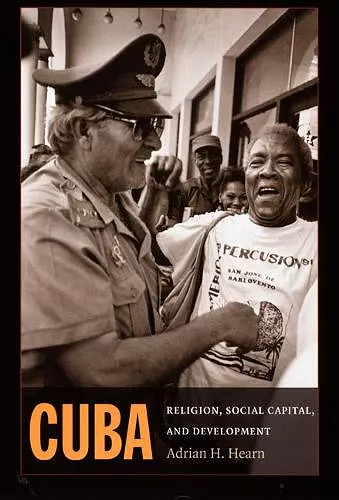Cuba
Religion, Social Capital, and Development
Format:Paperback
Publisher:Duke University Press
Published:18th Aug '08
Currently unavailable, and unfortunately no date known when it will be back

Argues that grassroots cultural actors and religious organizations have come to play an important role in social development in Cuba.
When Cuba's centralized system for providing basic social services began to erode in the early 1990s, Christian and Afro-Cuban religious groups took on new social and political responsibilities. This book analysis how the Cuban state and local religious groups collaborate on community-development projects.When Cuba’s centralized system for providing basic social services began to erode in the early 1990s, Christian and Afro-Cuban religious groups took on new social and political responsibilities. They began to work openly with state institutions on projects such as the promotion of Afro-Cuban heritage to encourage tourism, and community welfare initiatives to confront drug use, prostitution, and housing decay. In this rich ethnography, the anthropologist Adrian H. Hearn provides a detailed, on-the-ground analysis of how the Cuban state and local religious groups collaborate on community development projects and work with the many foreign development agencies operating in Cuba. Hearn argues that the growing number of collaborations between state and non-state actors has begun to consolidate the foundations of a civil society in Cuba.
While conducting research, Hearn lived for one year each in two Santería temple-houses: one located in Old Havana and the other in Santiago de Cuba. During those stays he conducted numerous interviews: with the historian of Havana and the conservationist of Santiago de Cuba (officials roughly equivalent to mayors in the United States), acclaimed writers, influential leaders of Afro-Cuban religions, and many citizens involved in community development initiatives. Hearn draws on those interviews, his participant observation in the temple-houses, case studies, and archival research to convey the daily life experiences and motivations of religious practitioners, development workers, and politicians. Using the concept of social capital, he explains the state’s desire to incorporate tightly knit religious groups into its community development projects, and he illuminates a fundamental challenge facing Cuba’s religious communities: how to maintain their spiritual integrity and internal solidarity while participating in state-directed projects.
“This is one of the best studies on civil society in Cuba that I have read. Adrian H. Hearn combines first-rate ethnography, theoretical sophistication, and a solid understanding of the complexities of the Cuban political context. By focusing on Afro-Cuban religious communities and international NGOs, Hearn shows how the interpenetration of state and citizen action has shaped civil society in Cuba. The result is a fascinating analysis of the ongoing transformations within the Cuban Revolution.”—Ariel C. Armony, Katz Distinguished Associate Professor of Government, Colby College
“This volume reveals the complexity of Cuban society through remarkable ethnographic research. Based on years of research in Cuba, the work documents the inner workings of communities that use deeply held religious beliefs to promote development projects aimed at securing basic needs. Through skillful analysis, Adrian H. Hearn reveals the realities of life for ordinary Cubans. This book is a major contribution to our understanding of contemporary Cuba, as well as an exemplar for all those interested in how religion and community development can intersect.”—Margaret Crahan, author of Religion, Culture, and Society: The Case of Cuba
ISBN: 9780822341963
Dimensions: unknown
Weight: 336g
232 pages